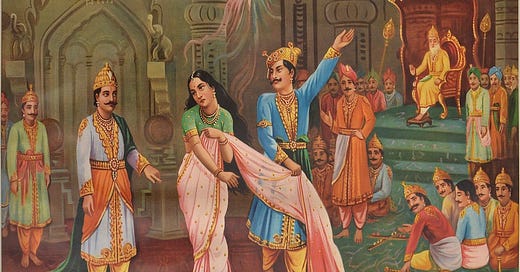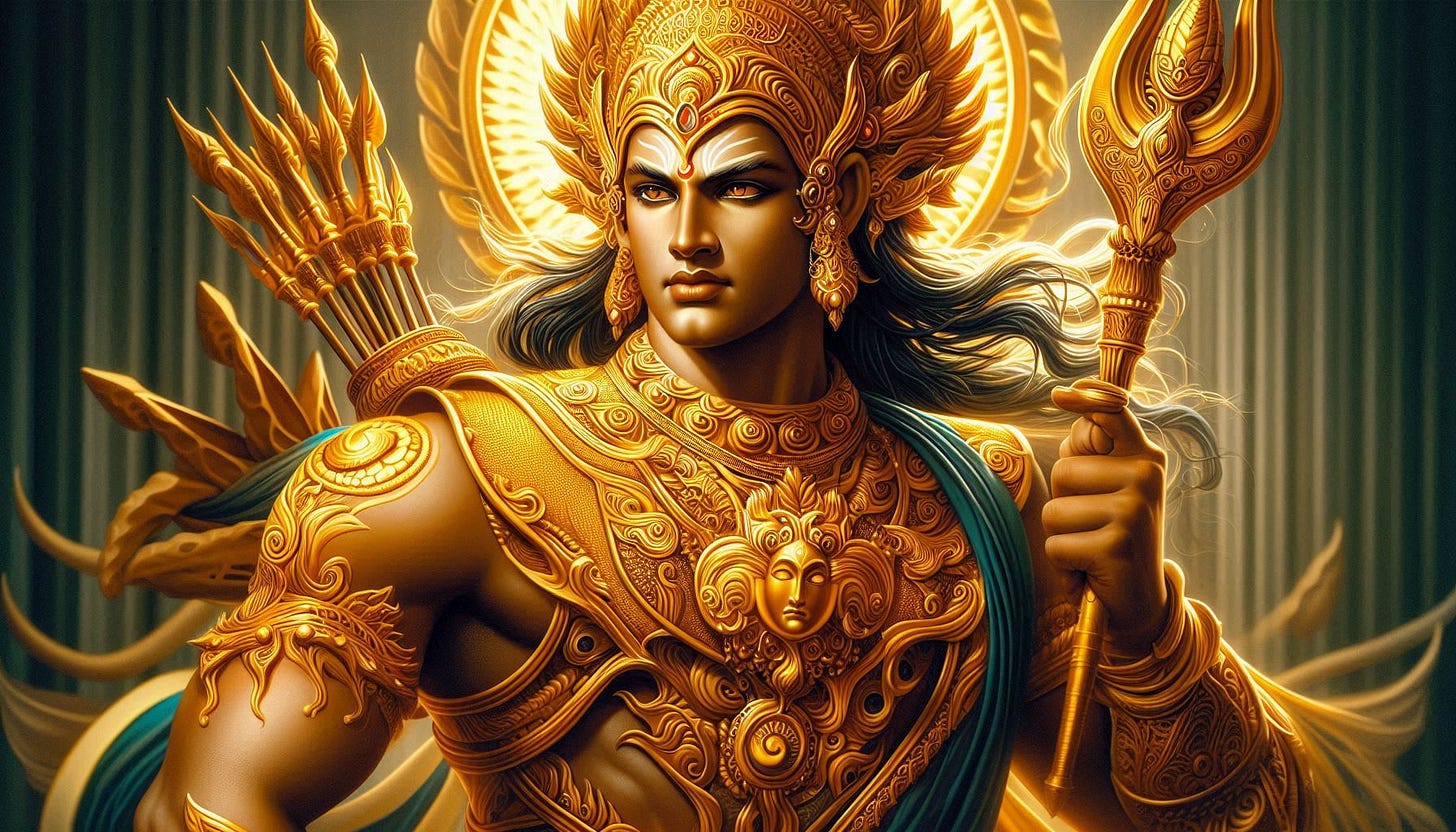Relevance of Mahabharat in today’s India: RG Kar, and the Caste System
‘What is here is found elsewhere, What is not here is nowhere’
It is famously said about the great Indian epic Mahabharat that ‘If a thing has not happened in the Mahabharat, it cannot happen in the whole universe.’ While recently writing on the GOAT in Mahabharat, I realized how true the saying is. Parallels between the epic and so many events in the country became apparent. Two specifically hit me, as I have previously written on both of them – the RG Kar rape and murder incident and the caste system.
Draupadi’s disrobal and the RG Kar incident
Draupadi was in a sense the First Lady of the Mahabharat. She was the wife of the five Pandavas, the Empress of Indraprastha, and an extraordinarily brave and courageous woman. Her attempted disrobal after Yudhisthir lost the game of dice was probably the tipping point in the epic, the point of no return.
The impact of the episode however is not as much about the behaviour of Duryodhan, Dusshasan, and Shakuni. They were anyway sworn enemies of the Pandavas and them stooping to this level, while still shocking, does not really change our perception of them. The biggest fall from grace due the incident is due to the behaviour of the other great warriors. Karna was actively involved in the disrobal, and even called Draupadi a whore. The senior statesmen and gurus Bheeshma and Drona also let this happen in front of them without intervening. They were till then relatively innocent – they had not directly schemed against the Pandavas or done anything else unworthy. Their behaviour during the disrobal though changes everything. It allows Krishna to justify the use of deceit in killing them. It also shatters the respect we have for them. Why didn’t they do anything to stop Duryodhan despite their power and standing?
Someone from a Whatsapp group I am on quoted a modern ‘epic’, Harry Potter, on this topic. She quoted Dumbledore - It is our choices that show what we truly are, far more than our abilities. Remaining silent is a choice. Alas, it was the most popular choice during the disrobal in the hall. Apart from Draupadi herself, less than a handful vociferously opposed what was happening – Vidura, Vikarna, Yuyutsu, and in a sense Bheema (who vowed revenge) and Gandhari (who prevailed in reverting things back to status quo). The defeaning silence of the great hall laid bare open everyone else’s faults in the epic.
Many Draupadis unfortunately face this in today’s India. The direct oppressors, the Duryodhans and Dusshasans, are of course to blame. But is the silence of those in power any different from that of Bheeshma and Drona? The silence after Unnao and Hathras, the silence in the face of the wrestler allegations, and the silence after the horrific RG Kar incident all show the same tale repeating itself. In fact, these cases also had direct or indirect connivance from the powers-that-be, which is much worse than the anguished inaction of Bheeshma and Drona. Again, the biggest fall from grace is that of our leaders, across the entire political spectrum.
Thankfully, (while we cannot say so for the opportunistic political class) the public at large has chosen NOT to remain silent during the RG Kar episode. They have chosen to voice their protest and anger. Perhaps this is one of the tipping points for our current civilization as well, the beginnings of our Dharma Yuddha for a better future?
Karna and the caste system
The debate about reservation vs merit is not going to die anytime soon. I used to be a die-hard ‘meritocrat’ during my college days. However, having seen more of the world thereafter, I have become more neutral, and believe that some form of active affirmative action (not necessarily reservations alone) is needed. I argued this in an earlier blog, taking parallels from the West. In brief, the argument was that the immigrants in the West are an equivalent to the lower class in India – they are discriminated against and consider inferior to the local population by many. And yet, we can see so many Indians shine through in the same generation or within one generation, becoming CEOs of big companies and even the PM of UK (and now Presidential candidate for US). On the other hand, since 75 years of independence, we do not see a lower caste CEO or PM in India despite them being 25% of our population. My argument was that there still is a systemic bias which they cannot overcome despite the reservations.
I now realize that there was no need to look towards the West for an example. Karna’s story demonstrates what the lower castes face. Karna was the son of the Son God and Kunti; he was essentially a demigod and a royal by birth. He was born and grew up with an impenetrable radiant golden armor (kavach and kundal). He was however cast away by the unwed Kunti, and raised by a charioteer (lower caste parent). Here is a person with all the merit you can possibly ask for. But how did his life unfold? He was repeatedly taunted for his lower birth across his entire life, despite his obvious merit and military prowess. He did achieve success in life, if you look at the traditional definition of success. He became the king of Anga. He had a loyal friend in the form of Duryodhan. Here is an orphan (from what he knows) who was drifting along a river to his probable death, but got lucky enough to find a set of doting parents, and then go on to become a great warrior and king.
And yet, Karna faced only ‘status’ anxiety throughout his life, as Gurcharan Das puts it. He knew he had greatness in him, that his destiny was better than that of a charioteer’s son, but the society constantly treated him otherwise. This constant barrage of small insults and smirks, of bullying and open discrimination, chipped away into his confidence and character. He eventually felt only resentment and bitterness towards the world for the way he was treated despite his merit. So much so that a simple act of Duryodhan acknowledging his skills and treating him like an equal human being was sufficient for Karna to overlook all his faults and feel indebted and loyal to him right till the end. Imagine a demigod facing such an inferiority complex across his life, not because he lacks merit, but because others treat him with disdain due to his caste. As I argued in my previous blog, perhaps a more content and ‘comfortable in his skin’ Karna could have achieved true greatness.
Think of the counter factual. If Kunti (instead of a charioteer) raised Karna as her first-born son , if Drona taught him with the same fervor as he taught Arjun, if the world treated him with the respect that was his due from day one, I am sure he would have achieved much more. More importantly, he would have been happy and content.
If this was the plight of the mighty Karna, imagine the plight of ordinary lower caste individuals. I would equate Karna’s shining golden armor with the intrinsic potential and merit in every lower caste individual, which keeps losing its luster and strength due to the combination of a less privileged upbringing and less exposure to opportunities (like training under Drona), continuous taunts faced across life (like being called sutputra – charioteer’s son – all the time), and many deliberate and not-so-deliberate exclusions from opportunities (like Draupadi’s refusal to let him participate in her swayamvar). Perhaps this explains why the lower castes are unable to achieve their intrinsic potential and reach the top positions in India?
The great epic indeed has much to learn from! Do leave your thoughts and comments on what I have written and on any other current-day contextual gleanings you have from the Mahabharat (I am sure there are many more!).
PS: This post is part of my first trilogy - on the Mahabharat; the other two are here and here. If you liked this one, do check them out as well!





Excellent, profound analysis! 👏